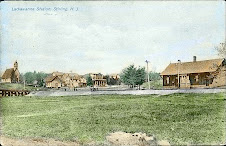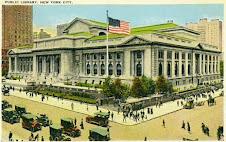 Robert Finley was born in 1772 in Princeton, New Jersey, the son of James Finley (b. 1737). The elder Finley, a native of Glasgow Scotland, immigrated to New Jersey in 1769 at the urging of his friend, Rev. John Witherspoon, who, a year earlier, was named president of the College of New Jersey, later known as Princeton University. Finley then established himself as a weaver, and was an elder in the local Presbyterian church.
Robert Finley was born in 1772 in Princeton, New Jersey, the son of James Finley (b. 1737). The elder Finley, a native of Glasgow Scotland, immigrated to New Jersey in 1769 at the urging of his friend, Rev. John Witherspoon, who, a year earlier, was named president of the College of New Jersey, later known as Princeton University. Finley then established himself as a weaver, and was an elder in the local Presbyterian church.His son, Robert, began his educational career under the tutelage of Rev. Ashbel Green, who eventually became president of Princeton College. A student who excelled in his studies in Greek, Latin, and other subjects in the humanities, Finley was admitted at the age of eleven to Princeton College, and was awarded his Bachelor of Arts degree at the age of fifteen in 1787. Shortly after his graduation, Finley, at the suggestion of Dr. Witherspoon, accepted a teaching position in the local grammar school. After a strenuous start, mainly caused by discipline problems with students in the grammar school who were older than their instructor, Finley overcame the situation through the staunch support of his mentor, Dr. Witherspoon.
Shortly after his tenure at the grammar school in Princeton, Finley was to head a seminary in Maryland, which never came to fruition, since the academy had been destroyed by fire. Soon thereafter, he returned to New Jersey, and was hired to teach at the academy in Allentown, New Jersey. During his time in Allentown, Finley was offered the prospect of employment as a teacher in Charleston, South Carolina, which he accepted.
It was in Charleston that Finley slowly realized that his calling was to the service of God, and returned to Princeton in 1792, where he began his study of theology under the supervision of Dr. Witherspoon. To earn his living while pursuing his studies, Finley taught at the grammar school in Princeton where he began his teaching career a few years earlier. On September 16, 1794, Finley’s efforts were rewarded when he was licensed to preach the gospel by the Presbytery of New Brunswick.
 In April 1795, the congregation in Basking Ridge, New Jersey offered the pastorate to Finley, which he accepted. On June 17, 1795, Rev. Robert Finley was ordained pastor of the congregation, where he would remain for twenty-two years. Shortly after undertaking the pastorate in Basking Ridge, Finley started instructing boys in preparation for college in a classical school established in 1751 by his predecessor, Rev. Samuel Kennedy. However, it was under Finley’s pastorate that the school flourished and became a permanent institution, with the completion of the schoolhouse on West Oak Street in 1809. This school would later become known as the Brick Academy. Among the students educated here were Theodore Frelinghuysen (1787 – 1862), U.S. Senator and president of Rutgers College, and Samuel Louis Southard (1787 – 1842), also a U.S. Senator and Secretary of the Navy.
In April 1795, the congregation in Basking Ridge, New Jersey offered the pastorate to Finley, which he accepted. On June 17, 1795, Rev. Robert Finley was ordained pastor of the congregation, where he would remain for twenty-two years. Shortly after undertaking the pastorate in Basking Ridge, Finley started instructing boys in preparation for college in a classical school established in 1751 by his predecessor, Rev. Samuel Kennedy. However, it was under Finley’s pastorate that the school flourished and became a permanent institution, with the completion of the schoolhouse on West Oak Street in 1809. This school would later become known as the Brick Academy. Among the students educated here were Theodore Frelinghuysen (1787 – 1862), U.S. Senator and president of Rutgers College, and Samuel Louis Southard (1787 – 1842), also a U.S. Senator and Secretary of the Navy.However, Rev. Finley’s career was not limited to education and religion. He was also an ardent proponent of giving free African-Americans the opportunity to settle and colonize in Africa, for, he believed, they could not ever participate fully in nor completely reap the benefits of living in American society. He elaborated more fully on the subject, claiming that the United States “should be cleared of them; we should send to Africa a population partially civilized and Christianized
 for its benefits; our blacks themselves would be put in better condition.” Consequently, he felt that the colonization scheme would resolve the matter. His efforts took him to the national stage in 1816, when Rev. Finley garnered support for his cause in Washington, which included men such as James Monroe, Daniel Webster, Henry Clay, and Francis Scott Key. This resulted in the formation of the American Society for Colonizing the Free People of Color in the United States, more commonly known as the American Colonization Society. A colony called Liberia was established shortly thereafter on the west coast of Africa, which by 1820, had a population of 12,000 black Americans.
for its benefits; our blacks themselves would be put in better condition.” Consequently, he felt that the colonization scheme would resolve the matter. His efforts took him to the national stage in 1816, when Rev. Finley garnered support for his cause in Washington, which included men such as James Monroe, Daniel Webster, Henry Clay, and Francis Scott Key. This resulted in the formation of the American Society for Colonizing the Free People of Color in the United States, more commonly known as the American Colonization Society. A colony called Liberia was established shortly thereafter on the west coast of Africa, which by 1820, had a population of 12,000 black Americans.Because of the notoriety he gained from the colonization issue, Rev. Finley was named president of the University of Georgia in Athens in 1817. Due to his extensive traveling that year, both from his journey from New Jersey to Georgia, and an exhaustive fundraising tour for the school throughout Georgia, Finley became ill, and later that year, died at the age of 45.
Rev. Finley was married to Esther Caldwell, the daughter of Rev. James Caldwell, who was pastor of the Presbyterian congregation in Elizabeth-Town (later Elizabeth), New Jersey. Together, they had nine children.
Sources:
Manuscript Collection 12, Reverend Robert Finley, D.D. Memoirs and Biography Collection, The Bernards Township Library (Basking Ridge, NJ).

